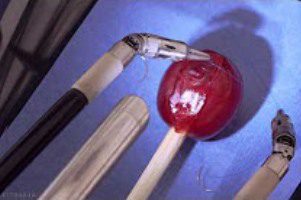
A new study is questioning the information that some hospital websites provide to patients regarding the benefits associated with the da Vinci Surgical Robot System. According to Reuters, much of the information provided to patients simply echoes marketing claims made by Intuitive Surgical, the maker of the da Vinci Surgical Robot. Even worse, few hospitals […]

Da Vinci Surgical Robot
A new study is questioning the information that some hospital websites provide to patients regarding the benefits associated with the da Vinci Surgical Robot System. According to Reuters, much of the information provided to patients simply echoes marketing claims made by Intuitive Surgical, the maker of the da Vinci Surgical Robot. Even worse, few hospitals provided patients with information on the robot’s potential downsides.
For the study, which appears in the American Journal of Obstetrics and Gynecology, researchers looked at 432 websites for U.S. hospitals that purported to provide patients with information about da Vinci Surgical Robot procedures. According to Reuters, the study found that:
“This is marketing,” said Dr. Jason Wright, a gynecologic surgeon at Columbia University in New York, and the study’s lead author. “Many of the claims that were made by hospitals were not supported by high-quality data.”
Wright pointed out to Reuters that patients trust hospitals to provide more-balanced information than manufacturers.
“Most patients have a higher expectation of physicians and hospitals,” he said. “Hospitals should have a mandate to supply unbiased information to patients.”
da Vinci Surgical Robot Injury Lawsuits
As we’ve reported previously, Intuitive Surgical received clearance from the U.S. Food & Drug Administration (FDA) to market the da Vinci Surgical Robot in 2000. It was originally marketed as an easier way to perform prostate surgery in men, but is now used to perform a large number of procedures, including heart bypass and valve repair operations, hysterectomies, prostate removal surgeries, weight loss surgery, and surgical treatment of bladder, kidney, colorectal, gynecological, prostate and throat cancers. Intuitive says that some 2,200 robots, which can cost as much as $2.5 million, have been installed worldwide since the da Vinci was brought to market.
While it is true that procedures that utilize the da Vinci robot offer advantages over “open” surgeries, which involve a large incision, it’s less than clear what advantages the robot has over traditional laparoscopy, Reuters said.
At least four personal injury lawsuits alleging the da Vinci Surgical Robot caused severe internal injuries, including burns, tears and other complications, some of which have resulted in death or chronic pain and disability, have been filed in federal courts around the country. Among other things, da Vinci Surgical Robot lawsuits fault the aggressive marketing tactics used by Intuitive to convince hospitals to purchase the expensive surgical robot, and allege that a combination of design flaws inherent in the robot, coupled with poor physician training on the device, has resulted in serious injuries.
A motion has been filed with the U.S. Judicial Panel on Multidistrict Litigation (JPML) seeking consolidation of all da Vinci Surgical Robot lawsuits in a single federal district for pretrial proceedings. The Panel will hear oral arguments on the motion this Thursday, July 26, 2012, in Cleveland, Ohio.


